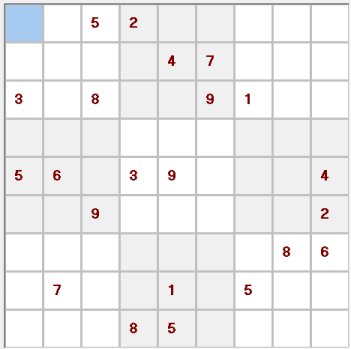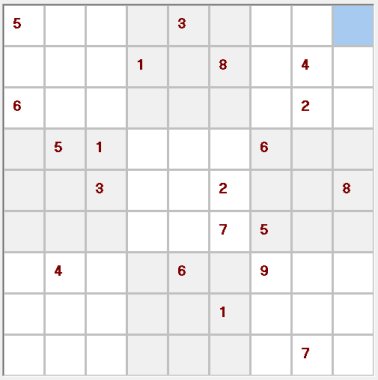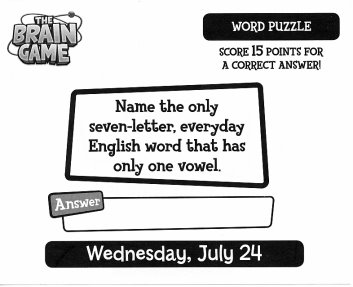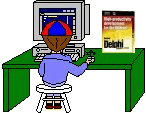What's New - July, 2013
[Home]
July 9, 2013: Key Scan Codes Version 3.1 posted today today fixes a problem introduced in V3.0 in the "Last Key Pressed" display. When there is no symbol associated with a key, the key name is displayed and long key names could overlay the "Caps Lock" and Num Lock" status displays. Also this version shows the symbol rather than the key name for punctuation and other special keys which have an associated symbol.
July 10, 2013:
 |
|
Generated Sudoku with 22 given values |
Our Sudoku program is a helper,
solver, and generator for that popular puzzle type. Like most of my
programs, I wrote this one because it seemed more fun and less tedious
than solving Sudoku puzzles by hand. There are dozens of
similar programs around, but none in Delphi that I was aware of at the time.
In any event, I had fun writing it and was quite satisfied with the "helper"
functions which allow users to enter and solve puzzles, and see "hints" about which number might fill empty
cells. The program could also generate random puzzles with a specified
number of "given" or empty cells. The generation task is the toughest nut
to crack as the number of given cells gets smaller and the number of possible
solutions to check for uniqueness increases.
Sudoku Version
4.0 posted today implements a new search algorithm which reduces the feasible
lower limit from 28 to 23 pre-filled cells. The absolute lower limit for a
puzzle with a unique solution has been proven (not by me!) to be 17 givens,
so our work is not yet finished but we are one step closer today.
July 17, 2013:
 I
spent a few more days working on
Sudoku Generator V4.1, posted today, which finds puzzles
with 21 filled cells (down from23) after several minutes of searching. Two
puzzles with 20 filled cells were generated but the longer solve time for the
one shown here was an impractical 4 hours. Reason enough to put it to rest
for now.
I
spent a few more days working on
Sudoku Generator V4.1, posted today, which finds puzzles
with 21 filled cells (down from23) after several minutes of searching. Two
puzzles with 20 filled cells were generated but the longer solve time for the
one shown here was an impractical 4 hours. Reason enough to put it to rest
for now.

July 24, 2013: 375 years ago Pierre Fermat conjectured that no two integers raised to power N could sum to an integer raised to that power for N > 2 (Fermat's Last Theorem), e.g. no sum of two cubed integers can ever sum to a cubed integer. It took 350 years for someone to prove the conjecture really was a theorem applying to all positive integers. It is called "Last" because it was the last of his asserted theorems to remain unproven for many years (until 1995). In 1769, Leonhard Euler, while not having proven Fermat's Last Theorem, had found a sum of 3 cubes which was the cube of an integer and published a generalized conjecture that at least k integers were required if the sum of their kth powers was itself to be the kth power of an integer. This is Euler's Sum of Powers Conjecture. It took almost 200 years before the first counterexample was found in 1966. I decided to try to to find it myself and Euler's Sum of Powers program, posted today in our Math section, does find the 5th power counterexample in about 8 seconds using a direct search technique. A 4th power counterexample was found in 1988, but the numbers are too large to be found by my program in its current form. To date, no counter example has been found for powers greater than 5 so I don't have much hope that this will be the tool to do it. But it will find all the Pythagorean triples (a2 + b2 = c2) that one could ever want! Oh, and the program makes it easy to recognize Plato's number; the smallest (only?) sum of cubes of 3 consecutive integers equal to the cube of the next (4th) consecutive integer. Fun!
July 28, 2013:
Our "Brain Games" daily calendar puzzles are usually pretty good, but the author of this one thinks that "Cyclist" is the only answer. Writing a program seemed more fun than simply turning the calendar page over find the solution. A 50 line beginner's level program performing a search of our 62,000 word dictionary finds the solution quickly - all 211 of them! Boy, did the Brain Game guy get this one wrong! Check out Word Search, the latest addition at the bottom of the Beginner's page.
